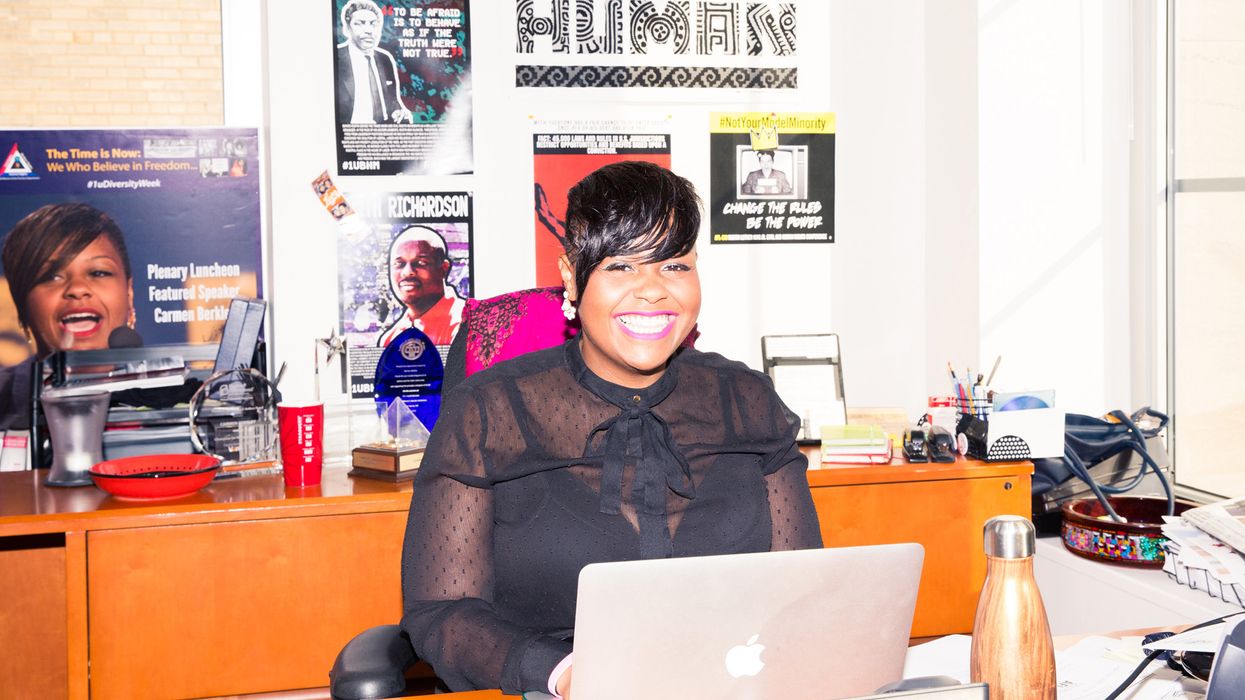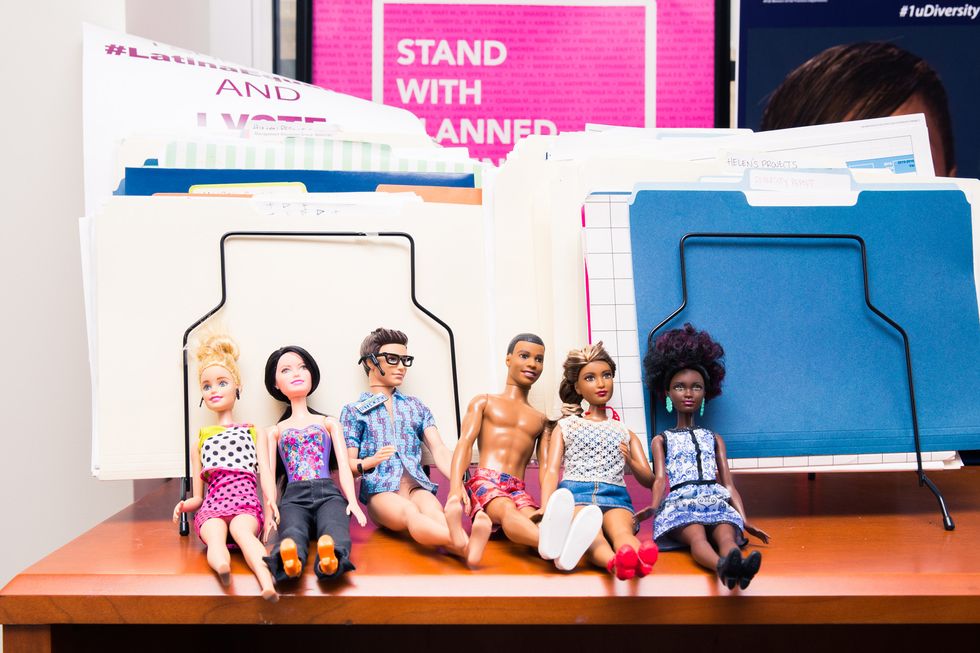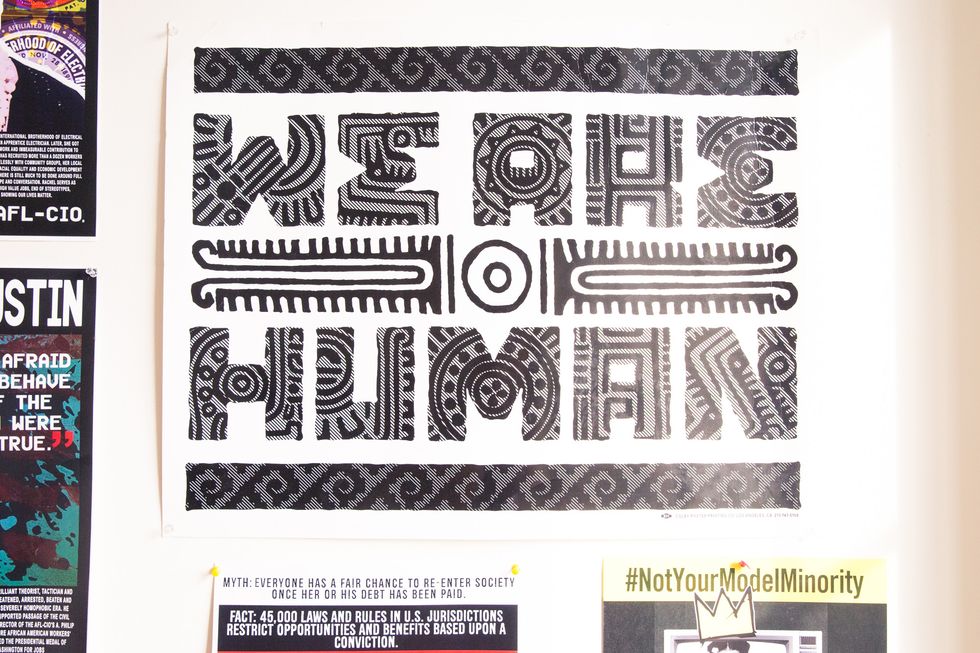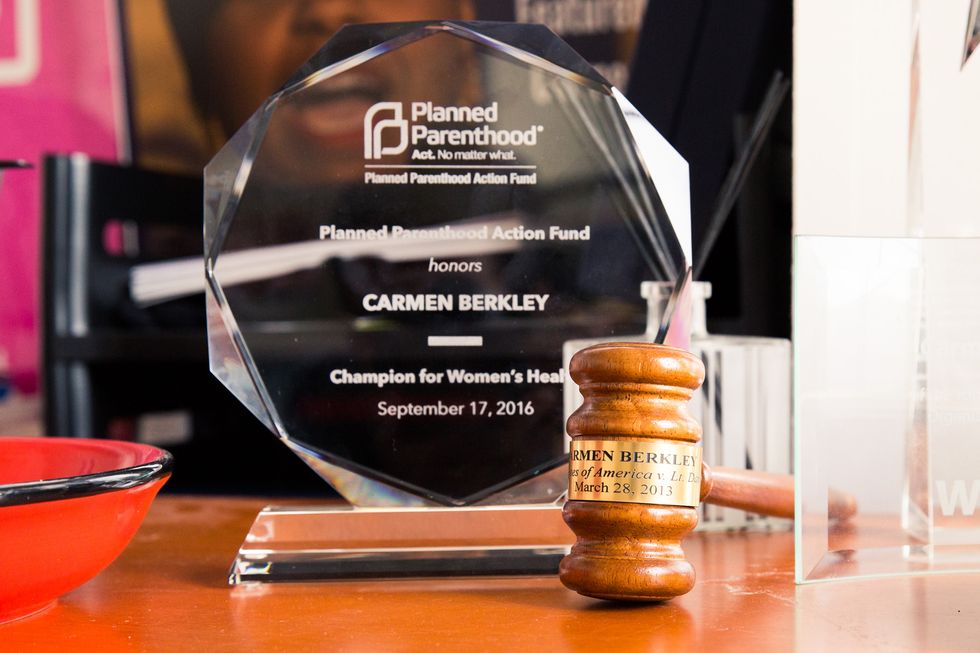The Woman Fighting for Marginalized Workers’ Rights in DC
Carmen Berkley will make you feel empowered and optimistic about politics. Promise.

The best thing about our jobs at Coveteur is getting to meet all the inspiring, excited people we feature every day. But it’s rare that we have such a blow-your-head-off session as our recent interview with Carmen Berkley, the Civil, Human and Women’s Rights Director of AFL-CIO (American Federation of Labor and Congress of Industrial Organizations—the country’s largest federation of workers’ unions). We left feeling so optimistic and inspired that we had the impulse to take ourselves out for a celebratory drink. Walking into AFL-CIO’s hulking DC headquarters (a literal stone’s throw from the White House), we weren’t exactly expecting to feel this way, but, like a few other politically active women, Berkley has a way of making politics feel personal. And, in her role protecting and fighting for women, people of color and LGBTQ union members, she’s able to advocate and actually make real change for real people. Sitting in her office surrounded by pictures of her with President Obama, Beyoncé quotes and a diverse set of Barbies (she swears her colleagues use them as surrogates to work through work challenges), Berkley talked about why real people need to have a hand in creating policy and the real significance of a potential Hillary Clinton presidency. Read this and we dare you not to feel optimistic and empowered when it comes to politics, too. (Imagine that!)
How her activist career began with fighting for access to higher education as a college student:
“I grew up with an activist—my mom is a flight attendant, she’s a union member, but I didn’t understand what a union was when I was a kid. When I went to college, my whole family sent me to college. Everybody had to chip in—my grandmother, my sister—and I went to a public school, the University of Pittsburgh, and when I got there I got hooked up with this organization called the United States Student Association. They were advocating on behalf of higher education access and I was so attracted to that because I felt that, even though I’m smart and even though I feel like I’m totally deserving of this education, I don’t know how I’m going to pay off these loans. Through the process of becoming more involved in this organization, they started to send me around the country to do activism around student debt—at the time, Bush was the president, so the whole political climate was different. In my senior year, they wanted me to run for vice president of the organization. I was all in. I did it and I moved to DC in August of 2007—I’ve been an activist ever since.
“Since then, I’ve jumped around. I worked at the United States Student Association, where I was the vice president and the president. I worked for the NAACP, where I was a regional field director and I got the chance to learn how to organize massive groups. I worked for a reproductive justice organization that was called Choice USA, and I ran a youth coalition that is called the Generational Alliance.”
What working at AFL-CIO means to her:
“The labor movement is the intersection of all the things that I care about: jobs, justice and education. Without a good job, you cannot sustain yourself or take care of your family; and without a good education it’s difficult to even function within society. For me, the justice part is most important because if women are treated differently, and if people of color and LGBTQ people are treated differently on the job, that’s not a way of living. I really wanted a way to bring those three things I care about—jobs, justice and education—together. And I’m super blessed: I’m 31, I’m the youngest department head that works here, I’m a black woman, and I run the civil rights department. I don’t take that for granted. I don’t take it lightly. I understand the significance of that to other young women or other young people of color. I try my best to use my powers for good.”

What her role as Civil, Human and Women’s Rights Director actually means:
“I’m the Civil, Human and Women’s Rights Director. What that means is, we represent people of color, women and the LGBTQ community who are not only a part of the unions, but who are also workers. Even though we care about the same stuff that white guys care about [laughs], how we think about childcare as a woman, for example, is different; how I think about my hours and my benefits is different. I have a stepson and he gets out of school earlier than I get off work. So when I’m thinking about myself, where I have a very privileged job—hell, I work across the street from the White House!—if I’m thinking about what time I get off, I can only imagine how a woman who works an 11-7 or an overnight job thinks about her schedule. For us, it’s really important to intersect with how people of color, women and LGBTQ people are affected by the workplace. I’ll give you another example: the bathrooms. People complain about gender-neutral bathrooms, but for the people that need them, going to the bathroom should not be something that they have to be stressed out about! Those are the issues that we take on in our department.
“Just as much as we’re totally focused on what union members need in their collective bargaining contracts, we are also focused on what is happening in social justice today. I’m not just a worker, I’m a woman. I’m a black woman. I’m a wife. I’m a sister. I’m a daughter. I’m a community member. We have taken on immigration, we have taken on criminal justice reform, we have taken on gender justice because all of those issues intersect with us being able to show up to work every day and be productive.”
How such a big job works in practical terms:
“I’ll give you an example with criminal justice reform. In 2013, our president, Richard Trumka, said, ‘We have to end mass incarceration.’ In 2013, we took it to our convention where our 55 affiliates passed a resolution saying, ‘The labor movement will start to work on issues pertaining to criminal justice reform.’
“First we look at how we intersect with criminal justice. We represent corrections officers. We represent librarians who work in prisons. We represent nurses that work in prisons, but we also represent people who were formerly incarcerated and who are now workers. We represent both sides of this issue—but how do we help people who are formerly incarcerated get good jobs? At the end of the day, they have paid their debt to society, we still need them to be able to contribute. For the workers in prisons, their jobs are very dangerous. Corrections officers get to retire at 50 because their life expectancy is 59.
“So what are we doing? We went into a women’s prison with John Legend. Within that prison is a building trades program where they are teaching women trades and skills so that when they get out we can pump them into a union job. What does that mean? That means making $18-$22 an hour. If you are coming out of prison and you are making $22 an hour, that completely changes your life! Their recidivism rate is extremely low because we are giving them a job. The result of that visit was the governor of Washington passed ‘Ban The Box,’ meaning when people fill out their job applications they are not going to be discriminated against because of a mistake that they made.”

Why her job matters:
“The labor movement is made up of 46 percent women. It’s about one fourth people of color—our numbers are growing. Every issue we work on at the AFL-CIO, women and people of color are disproportionately impacted. It’s okay to talk specifically about a woman’s perspective or specifically about a black woman’s perspective. One thing that we realized this year is that black women win elections. President Obama would have lost by five electoral votes if black women didn’t show up in 2012. We created a report that was just about those black women. It’s just a piece of paper, but we have gotten so much love just for saying, ‘You exist. We see you and we acknowledge you.’ To me that is what working on gender justice and racial justice is about. In our department, we do our work from a racial and gender justice lens. Any issue that we work on—health care, benefits, wages—I want to know how women and people of color are being impacted.”
Why her job isn’t just about politics:
“I see my job as healing work. When you provide someone with the benefits and the wages that they need to sustain their life, it’s more than just politics. It’s about making sure that people can live a better life. My mom has been a flight attendant for over 30 years. Without her having the wages and the benefits, I wouldn’t have gone to college. I wouldn’t be as articulate as I am. To me, when I think about people from back home in Pittsburgh who don’t have those opportunities, it’s directly related to families not having an adequate job. It is political in nature, I see it as more than that.”
But the political side definitely makes a difference:
“Before Obama, we weren’t involved. I was working at United States Student Association and [we] weren’t allowed to go to the White House; we never got invited to the Department of Education. After his inauguration, we immediately started getting meetings with the White House, the Department Of Education and different agencies around DC because they wanted to understand what advocates and real people care about. The fact that so many of my friends started working for the White House—are you serious?!—and were invited to go to the White House Christmas party, or were even able to meet Michelle Obama or Biden, and to have a real conversation with people that we elect [changed everything]. It was as if the sea had parted. Even if we didn’t agree with the administration, at least we knew that they were going to listen to us. When I look at the debate and I see just how dismissive Donald Trump is, it reminds me that the other side of having President Obama is being completely shut out of the political process. As a young woman and as a young black woman, I deserve to be a part of the political process.”
Why she’s petitioning union members to vote for Hillary:
“Secretary Clinton has a record of standing up for working people. I’m talking from when 9/11 happened and she made sure the firefighters and first responders were actually being taken care of. She has always been an advocate for unions. She cares about women’s issues and talks about equal pay and childcare.
“And let’s face it: she’s a woman! More than half of us are breadwinners, a lot of us are single, some of us are in same-sex relationships—our role is different. When my husband comes home, no, there isn’t food on the table because I get home after him. I think she is a representative of what the modern woman is. Some people don’t like it—some people see her as being bitchy. I identify with her in the sense that I am a working woman that wears a pantsuit to work. Sometimes people don’t like me because I am too direct and I tell it like it is. But the boys have been playing that way the whole time! She is a good example of what our future could be: that we can be President of the United States, too.”

Why you need to be political (even if you don’t think politics have any effect on you):
“I get my hair done every 7-10 days and at my hairstylist’s they are not always talking about politics, but they are talking about anything else: Solange’s new album, pop culture. What concerns me is that people don’t always connect why we need to be political to having a better life. I know a lot of people who are really disconnected from this election and I’m like, ‘Well, you care about your kid’s school, right? You care about these potholes? You care about the fact that we have a CVS in our community, but we don’t have a grocery store?’ If you care about those things, then you have to care about politics. What President Obama was able to galvanize was people that didn’t necessarily care about politics were all in. They might not even understand the three branches of government, but they knew that they were voting for Barack Obama. They knew that Michelle Obama wore a Versace dress. My fear is people are not into politics and we need them to be! Policy cannot just be created by Harvard graduates; it’s got to be created by real people that live real lives in real cities.”
Why women need to take risks:
“Take risks. My whole career has been a risk. This was not my dream. It’s become my dream because I get to travel around the world advocating and organizing around issues that I care about. So many people have told me, ‘You are too loud, you talk too much, don’t say that, don’t wear that, why do you have a slit in your hair?’ I don’t care. I feel that the universe put me on this earth to be my unique self, and all of the women that I look up to operate like that. They’re risky. I want women to take risks because men take huge risks! They take risks with our money on Wall Street; they take risks by investing our pensions. We should be able to take risks at work too. Sometimes it gets me in trouble, but 90 percent of the time the risk of just being myself has been worthwhile.”